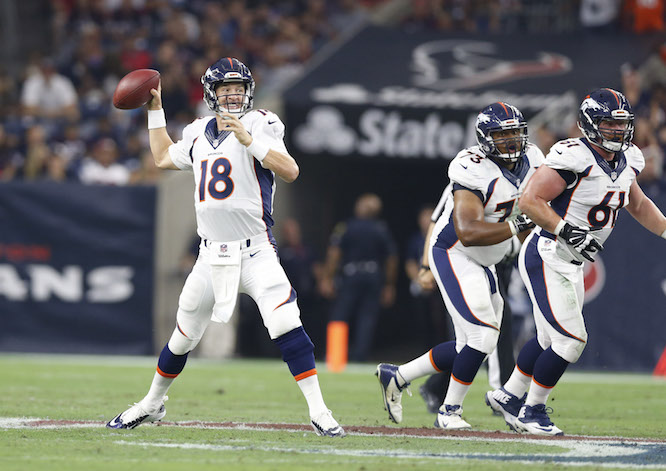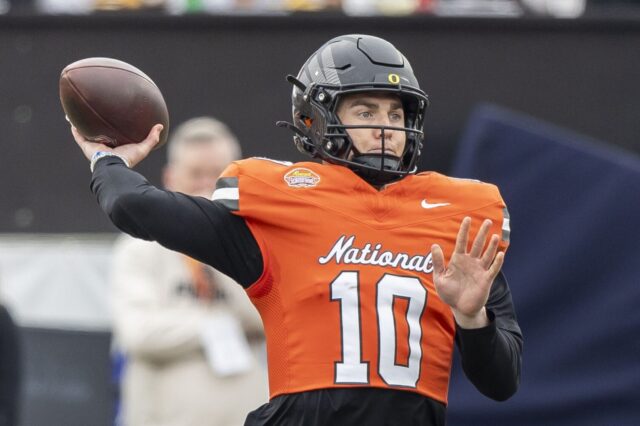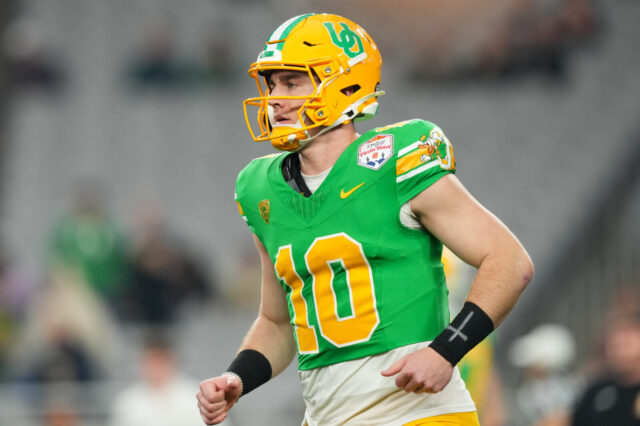The stats don’t matter. And the end results aren’t important, either. For the most part, nothing really matters in a preseason game.
But that doesn’t mean the exhibitions are completely meaningless. In reality, there are things to be gleaned, slices of information that can be pieced together to come up with the bigger picture. It’s just a matter of knowing where to look and what to watch.
Such was the case on Saturday night when Peyton Manning made his 2015 debut.
It was the quarterback’s first live action since the end of last season, when plenty of people were questioning if the future Hall of Famer still had anything left in his magical right arm. And it was No. 18’s first appearance since Gary Kubiak was hired as the Broncos head coach, a change atop the org chart that is sure to reshape how the team operates.
As such, there were plenty of interested eyes focused on Houston, waiting to see how Manning would perform. And for the most part, they results were pretty ho-hum.
By the time his limited action was done, the Broncos quarterback had completed eight of 14 passes for 52 yards, leading his team to zero points in four drives. While not necessarily quite the “struggle” that the Denver Post touted as the game was still being played, it certainly wasn’t a dazzling debut.
The cause for concern, however, isn’t what people think. Forget about the numbers; Manning didn’t play long enough to amass any of significance. And don’t sweat the lack of scoring; penalties and dropped passes ultimately doomed Denver’s drives during the star quarterback’s time in the game.
What was troubling, however, is the offense Denver ran during Manning’s quarter-plus appearance. Instead of being the classic Mike Shanahan / Gary Kubiak system that Broncos fans have become quite accustomed to watching, it was very similar to the frenetic, fast-paced, pass-happy approach that has been the norm since No. 18 came to the Mile High City.
The Broncos ran 21 plays against the Texans with Manning behind center; 14 of them were passes. Of those 14 pass plays, nine started with the quarterback in the shotgun formation. And throughout all four series that saw the starters in the game, Denver employed the hurry-up offense.
None of those things are hallmarks of Kubiak’s offense. In fact, they are all contrary to the fundamentals of the system; the new-look Broncos are supposed to be a run-first team, with the quarterback lined up under center, in an effort to become a ball-control offense. That is far from what transpired on Saturday.
That begs the question: Why is that the case?
From the very limited sample size that is currently available, it certainly seems as if Manning has won whatever power struggle has occurred at Dove Valley. Based on what Denver did in Houston, it looks as though the team’s offense is going to be similar to what the star quarterback has been running throughout his illustrious career.
That may seem like a good idea; after all, why ask a 39-year-old player to adjust in the final years of his career? But that ignores the reasons why Kubiak was hired in the first place.
As the Broncos have learned the hard way the past three seasons, a one-dimensional team is most likely doomed in the postseason. When the games are important, the great teams can move the ball both through the air and on the ground.
This was the same realization that Shanahan came to when he was hired as the Broncos head coach in 1995; despite having John Elway at quarterback, the Mastermind knew that he needed to rely less on the future Hall of Fame inductee, not more. The same can be said right now for Manning; he needs to be the triggerman of a balanced attack, not one that is completely dependent on him to carry the offensive load.
And that’s what this season was going to bring. Kubiak’s offense was supposed to do for Manning what Shanahan’s did for Elway; that’s what everyone has been told throughout the offseason. At the very least it was expected to be a hybrid of the two, melding the strengths of both – the Manniak (TM pending) offense, if you will.
But that didn’t seem to be the case on Saturday. Instead, Denver once again looked like a team that was trying to appease their star quarterback, running what he wanted instead of what the head coach has planned.
Perhaps it was an aberration. Maybe the Broncos ran so many plays out of shotgun because they were skittish about their young offensive line’s ability to protect Manning. Maybe their penchant for passing was just a byproduct of the way the game unfolded. And maybe the hurry-up approach was simply a matter of using a short preseason stint to work on multiple things at once.
That’d be the ideal. Otherwise, it would suggest that not much has changed in Denver.
The Broncos need to have an identity. They need to know what they are and what they do; that’ll provide them something to lean on during pressure moments. They can’t be a hodgepodge of a bunch of different things; they need to be In N’ Out Burger, specializing in a few key items, as opposed to The Cheesecake Factory, with a book like menu of mediocre items.
Kubiak was brought in for a reason; the Broncos need to have the conviction to run his offense, all of the time. It’s not practical to ask players to learn two different systems. And it’s not possible to build a roster that is equipped to play two different ways.
Denver is moving toward running Kubiak’s offense; their offensive line is being built for it, while the skill position players on the roster are perfectly suited to execute it. Their quarterback needs to get the memo.
It’ll be the best thing for Manning, as he’ll have a chance to enjoy the type of success late in his career that Elway did. And it’ll be best for Kubiak and Company, as their system may make average quarterbacks look good but has never reached the NFL’s pinnacle without an all-time great behind center.
The Broncos shouldn’t run Manning’s offense. They shouldn’t compromise with some kind of a hybrid. It’s time for them to stick to their guns and run the system they want to; it’ll be better for everyone involved, including No. 18.



